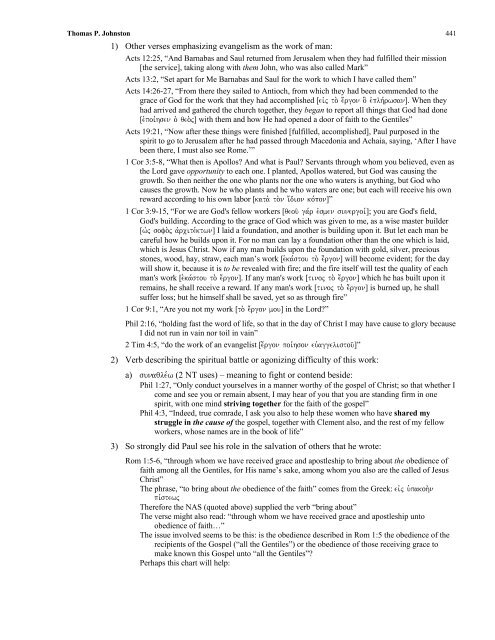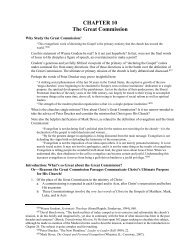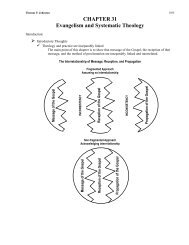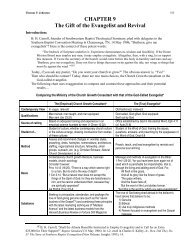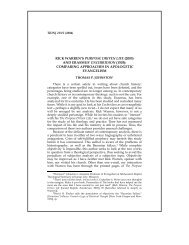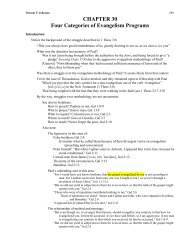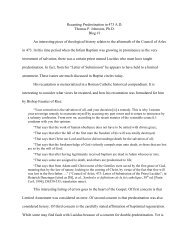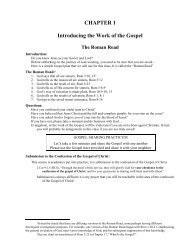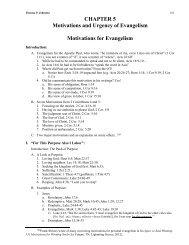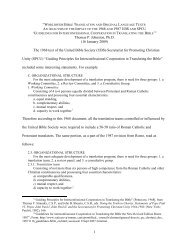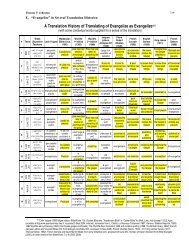CHAPTER 7 Defining Evangelizing - Evangelism Unlimited
CHAPTER 7 Defining Evangelizing - Evangelism Unlimited
CHAPTER 7 Defining Evangelizing - Evangelism Unlimited
You also want an ePaper? Increase the reach of your titles
YUMPU automatically turns print PDFs into web optimized ePapers that Google loves.
Thomas P. Johnston 441<br />
1) Other verses emphasizing evangelism as the work of man:<br />
Acts 12:25, “And Barnabas and Saul returned from Jerusalem when they had fulfilled their mission<br />
[the service], taking along with them John, who was also called Mark”<br />
Acts 13:2, “Set apart for Me Barnabas and Saul for the work to which I have called them”<br />
Acts 14:26-27, “From there they sailed to Antioch, from which they had been commended to the<br />
grace of God for the work that they had accomplished [eivj to. e;rgon o] evplh,rwsan]. When they<br />
had arrived and gathered the church together, they began to report all things that God had done<br />
[evpoi,hsen o` qeo.j] with them and how He had opened a door of faith to the Gentiles”<br />
Acts 19:21, “Now after these things were finished [fulfilled, accomplished], Paul purposed in the<br />
spirit to go to Jerusalem after he had passed through Macedonia and Achaia, saying, ‘After I have<br />
been there, I must also see Rome.’”<br />
1 Cor 3:5-8, “What then is Apollos? And what is Paul? Servants through whom you believed, even as<br />
the Lord gave opportunity to each one. I planted, Apollos watered, but God was causing the<br />
growth. So then neither the one who plants nor the one who waters is anything, but God who<br />
causes the growth. Now he who plants and he who waters are one; but each will receive his own<br />
reward according to his own labor [kata. to.n i;dion ko,pon]”<br />
1 Cor 3:9-15, “For we are God's fellow workers [qeou/ ga,r evsmen sunergoi,]; you are God's field,<br />
God's building. According to the grace of God which was given to me, as a wise master builder<br />
[w`j sofo.j avrcite,ktwn] I laid a foundation, and another is building upon it. But let each man be<br />
careful how he builds upon it. For no man can lay a foundation other than the one which is laid,<br />
which is Jesus Christ. Now if any man builds upon the foundation with gold, silver, precious<br />
stones, wood, hay, straw, each man’s work [e`ka,stou to. e;rgon] will become evident; for the day<br />
will show it, because it is to be revealed with fire; and the fire itself will test the quality of each<br />
man's work [e`ka,stou to. e;rgon]. If any man's work [tinoj to. e;rgon] which he has built upon it<br />
remains, he shall receive a reward. If any man's work [tinoj to. e;rgon] is burned up, he shall<br />
suffer loss; but he himself shall be saved, yet so as through fire”<br />
1 Cor 9:1, “Are you not my work [to. e;rgon mou] in the Lord?”<br />
Phil 2:16, “holding fast the word of life, so that in the day of Christ I may have cause to glory because<br />
I did not run in vain nor toil in vain”<br />
2 Tim 4:5, “do the work of an evangelist [e;rgon poi,hson euvaggelistou/]”<br />
2) Verb describing the spiritual battle or agonizing difficulty of this work:<br />
a) sunaqle,w (2 NT uses) – meaning to fight or contend beside:<br />
Phil 1:27, “Only conduct yourselves in a manner worthy of the gospel of Christ; so that whether I<br />
come and see you or remain absent, I may hear of you that you are standing firm in one<br />
spirit, with one mind striving together for the faith of the gospel”<br />
Phil 4:3, “Indeed, true comrade, I ask you also to help these women who have shared my<br />
struggle in the cause of the gospel, together with Clement also, and the rest of my fellow<br />
workers, whose names are in the book of life”<br />
3) So strongly did Paul see his role in the salvation of others that he wrote:<br />
Rom 1:5-6, “through whom we have received grace and apostleship to bring about the obedience of<br />
faith among all the Gentiles, for His name’s sake, among whom you also are the called of Jesus<br />
Christ”<br />
The phrase, “to bring about the obedience of the faith” comes from the Greek: eivj u`pakoh.n<br />
pi,stewj<br />
Therefore the NAS (quoted above) supplied the verb “bring about”<br />
The verse might also read: “through whom we have received grace and apostleship unto<br />
obedience of faith…”<br />
The issue involved seems to be this: is the obedience described in Rom 1:5 the obedience of the<br />
recipients of the Gospel (“all the Gentiles”) or the obedience of those receiving grace to<br />
make known this Gospel unto “all the Gentiles”?<br />
Perhaps this chart will help:


